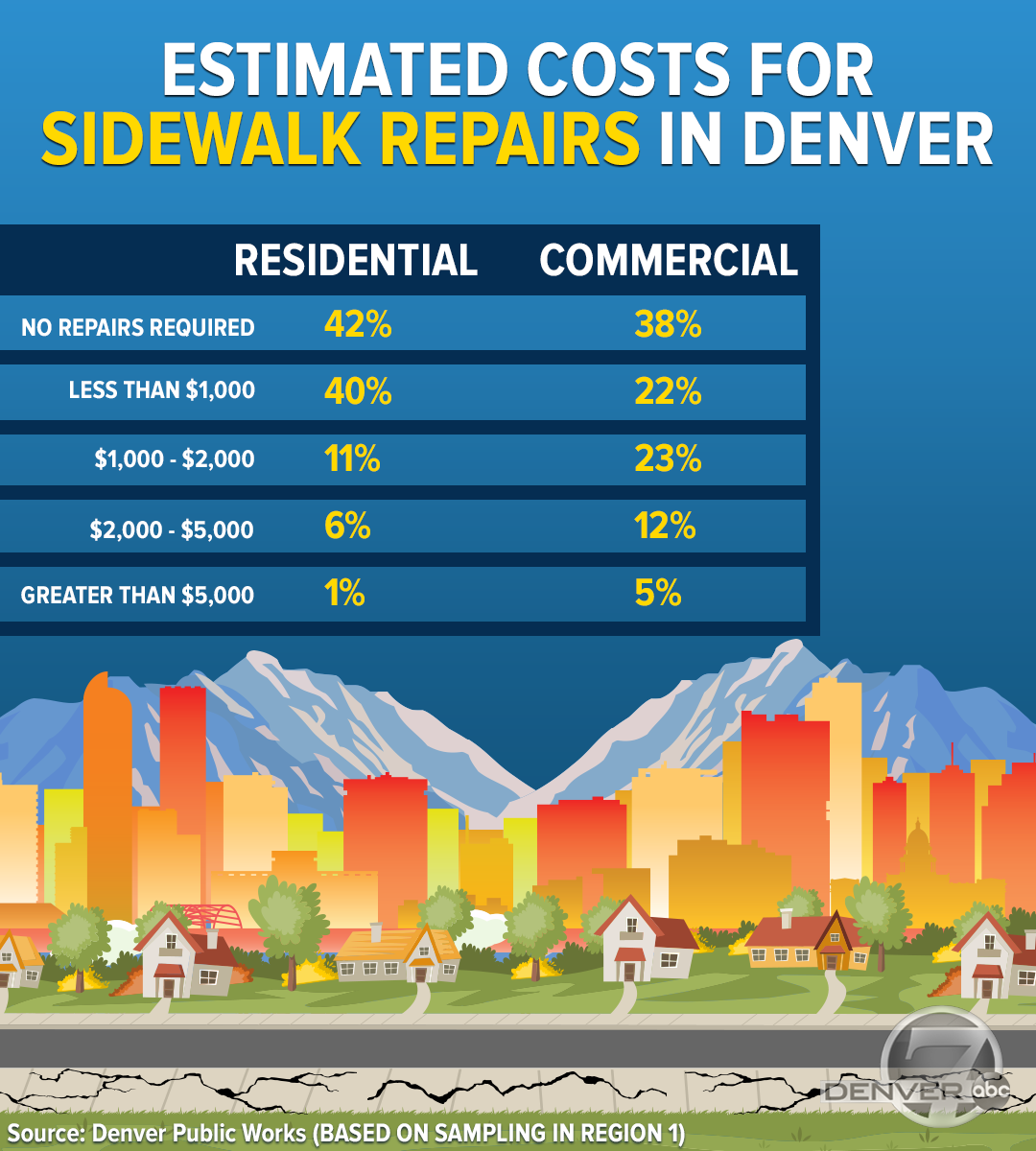DENVER — The goal of creating well-maintained sidewalks across Denver may soon become a headache for property owners.
Sidewalks around the city are about to undergo mandatory repairs on the property owners’ dime.
This month, a city inspector will start hunting for damaged and uneven sidewalks that need repair in Denver as part of the Neighborhood Sidewalk Repair Program. City ordinance says the cost to fix them falls on the property owners’ laps. Residents will have 45 days after notification to make the repairs.
“Denver has been building sidewalks for 150 years and we have never taken a comprehensive approach to assessing the condition of those sidewalks,” said City Councilman Paul Kashmann. “The only repairs that have been made over the years have been complaint-based.”
The city receives only 10 to 20 complaints a year.
“People generally just kind of grumble and blow it off,” Kashmann said.
And so the sidewalks were never repaired.
But that’s changing soon.
An inspector will walk block by block, analyzing the sidewalks and notifying property owners of any damage they find. The program broke the city into 11 regions and Region 1 — which includes the City Park, Congress Park, Cheery Creek, Country Club, Cheesman Park, Speer, Capitol Hill and North Capitol Hill neighborhoods — is up first, according to the city. The map below illustrates the whole region, as well as the first section the inspector will visit.
The areas were prioritized based on lowest rate of car ownership, highest rate of youths, seniors and people disabilities, and amount of damaged sidewalks in proximity to schools and transit systems, as well as along main streets.
Residents will receive a notice on their door and in the mail if the sidewalks on the property need repair, providing them with the requirements, estimated costs and more, according to the city.
Property owners have two options: They can either repair the sidewalks themselves or pay the city to do it.
The corrections will vary from partial or full replacement of the concrete slabs, to grinding or shaving of uneven sidewalks, to re-leveling or replacing flagstones.
How much will this cost property owners? It will vary, depending on the repairs needed.
“We realize that it’s going to be an unexpected expense for some homeowners,” Kashmann said. “Now, we want to be sensitive to those people (who) simply don’t have the dough.”
Financial aid is available. The city will offer extended repayment assistance and affordability discounts for those who qualify, and will authorize less expensive repair methods that aren’t normally allowed, such as patching and grinding.
The city took a sample of 100 residential and 100 commercial properties in Region 1 to understand the costs for these repairs.
"In terms of residential, we estimate 42 percent of properties will require no repairs," said Nancy Kuhn, director of public information with Denver Public Works. "Of the 58 percent residential properties remaining that need repairs, we estimate the cost to 40 percent of those properties will be under $1,000."
An estimated 11 percent of residential properties will need to fork out between $1,000 and $2,000, 6 percent will pay between $2,000 and $5,000 and 1 percent will face a bill greater than $5,000. An estimated five percent of commercial properties will pay more than $5,000.

Kashmann said there are a considerable amount of homeowners who may not realize the sidewalks outside their home are their property, and therefore their responsibility, but it is a common practice in many cities.
He said program staff not sure how it will take to fix the sidewalks in all 11 regions of Denver.
“We’ll know a lot more in about 60 or 90 days,” he said. “I believe that this is — Region 1— as complicated a region as we have around the city. It has a lot of older neighborhoods, it has mature trees close to the sidewalks, it has a lot of flagstone sidewalks, which present special challenges. It’s going to be a challenging one, so we’ll learn a lot.”
The inspector is expected to start identifying sidewalks that need repair in mid-August.
This program does not address missing sidewalks, which is a separate initiative.
The city will hold a public meeting Aug. 11 from 10 a.m. to noon at the Denver Botanic Gardens, located at 1007 York St., for property owners in Region 1. For more information on this program, call 311.



